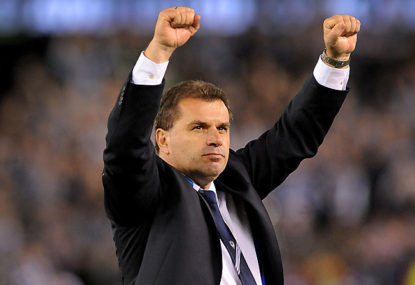In October 2013, the Socceroos were in disarray. They had been for some time, though the Football Federation of Australia were reluctant to admit it.
Australia had recently qualified for their third consecutive World Cup under manager Holger Osieck, but the tide was nevertheless turning against the German national.
Results had been sub-par, the team was playing dire, one-dimensional football, and there was a lack of vision in selections.
But a late Josh Kennedy header against Iraq in June papered over the cracks in securing a spot on the world stage, and it was seemingly job done for Osieck. He’d been tasked with steering the Socceroos into football’s biggest tournament and had succeeded.
For most managers, that would have been enough to guarantee them a year or two more in the job. But not for Osieck. There were grounds for sacking him then and there, but the FFA stalled.
Instead the Socceroos went through a less than inspiring East Asian Championship, albeit with A-League players, and then dished out two humiliating performances in losses to world powerhouses France and Brazil.
FFA reacted, months too late, and Osieck was duly sent packing.
Preparation for the World Cup was now askew, and a new leader had to be found quickly to try and pick up the pieces.
A number of candidates were put forward – namely Tony Popovic and Graham Arnold – but in the end there was only one man the public would truly accept. That man was Ange Postecoglou.
Despite the attributes of his competitors for the role, Postecoglou was always the man everyone wanted. His work with Brisbane Roar had produced some of the best football to grace the A-League, and there were signs his time in charge of Melbourne Victory was starting to bear fruit.
So it was, on October 25, 2013, that Postecoglou took charge of his first game, a 1-0 victory over Costa Rica. It was the start of a new era, but one that was always going to take time and patience.
Postecoglou was perhaps the only manager going to the World Cup that had a license to lose without the threat of losing his job. Three losses for any other tournament boss would have resulted in dismissal, but Postecoglou’s main target was much, much bigger.
He was tasked with turning an uninspired and flat national side into a team that could play attractive football, a team that supporters could be proud of. Osieck had killed the excitement around the Socceroos. He was better than predecessor Pim Verbeek, but not by much. The team needed a dose of rejuvenation.
Postecoglou was charged with bringing back the romance, installing a vision, embracing a philosophy and giving the Socceroos an identity. A five-year contract signaled that the FFA was also willing to give him time to achieve these ambitious goals.
Tasked with completely revolutionising a stagnant national team, the job was always going to take longer than the public expected. Indeed, it is probably taking longer than even Postecoglou expected.
After arriving to much fanfare, and being lauded as the Socceroos’ saviour, Postecoglou’s stocks have since fallen. Not with everyone, but enough to make his job that much harder.
When he took over he could do no wrong. He trimmed the squad of its ageing stars – Lucas Neill, Brett Holman, Mark Schwarzer, Sasa Ognenovski, Luke Wilkshire – with Marco Bresciano the sole survivor.
A new-look backline was introduced, Crystal Palace enforcer Mile Jedinak was installed as captain and the seeds of an attacking mentality were planted. Gone was the lone striker mould from Osieck’s days and in came a front three.
Youth was given a chance, and players such as Tommy Rogic, Curtis Good and Adam Taggart were thrust into the spotlight.
Yet three losses in the World Cup – to Chile, the Netherlands and Spain – wasn’t too pleasing for some detractors. A record since of just one win, three losses and a draw hasn’t helped either. Postecoglou’s overall record stands at just two wins from 12 games.
It’s hardly inspiring stuff, but a bit of perspective has to be taken into account.
To start with, Postecoglou has been unable to call upon his ideal starting line-up.
Rhys Williams and Good have been cut down by injuries, as have Rogic and Matthew Spiranovic. Meanwhile, the continuing form of Tim Cahill has made him impossible to drop, and Australia can’t complete the transition to Postecoglou’s preferred tactics without his retirement.
Postecoglou has also taken a hard route in developing his squad. He’s targeted big nations to compete against in friendlies – Belgium and Japan – and taken his side to the volatile and harsh conditions in the Middle East. Next season’s friendly against Germany is further proof that Postecoglou won’t cop out – he wants his players to be tested.
His training camps have reportedly been high-intensity and at times draining. Instead of wrapping his players in cotton wool, he’s fed them to the lions, and the baptism of fire hasn’t subsided.
Yet that hasn’t stopped the armchair critics slinging mud, in particular remarking that three losses at a World Cup, no matter how you dress it up, is a failure, and that not beating the likes of Qatar and Saudi Arabia is unacceptable.
The World Cup was an undoubted success for the future development of the national team. The Socceroos went home pointless, but they also left with a renewed sense of confidence.
Foreigners who had chalked Australia off sat up and took notice as Postecoglou’s charges took the game to Chile and the Netherlands. They played with an intent that hadn’t been seen for a long time, Socceroos fans could finally watch their side play with pride again.
Some of the football Australia produced was a minor miracle when compared to the garbage they had served up during World Cup qualifiers. Postecoglou achieved a lot in a short space of time, but the work is nowhere near complete.
If the FFA had had the guts to get rid of Osieck earlier, then the preparation for the Asian Cup would be near perfect.
However, with a limited timeframe, it’s been a battle to get the players up to speed with the new direction. But there are signs it’s coming together.
While the friendlies is the Middle East were uninspiring, the Socceroos put in a promising shift against Japan, who are favourites for the Asian Cup.
In the first period the team showed the fluid movement and interplay that Postecoglou’s sides are commonly know for. The end product was still missing, but the signs were there.
In the end, some woeful defending led to Japan scoring two quick-fire goals. They were horrendous mistakes, but nothing that can’t be ironed out in time for the Asian Cup.
The Asian Cup on home soil in January is a huge opportunity for Ange to win back the love he started with. It is a huge opportunity for the players to repay the faith and to prove the haters wrong, if one thing’s certain it’s that they are 100 per cent behind their boss.
The team has shown undoubted improvement since Postecoglou’s arrival, and fans have to realise that it will be a slow process before he can truly play his desired brand of football.
Postecoglou will get it right, whether he can do it in time for an Asian Cup victory is hard to say however. The competition is no walkover, there are no longer any easy games in the Asian confederation.
Teams like Qatar and Saudia Arabia have had millions pumped into their national set-ups and domestic leagues, while Japan and South Korea are currently ahead of Australia in their development as football nations.
But victory at the Asian Cup is a possibility, and it’s the minimum aim for Postecoglou and his players, regardless what the media and public’s expectations are.
The training camp starts on December 27 with the final squad due before December 30. The selected 23 then have less than two weeks to make it work, before they face Kuwait in the first group match on January 9.
Hopefully the Socceroos can secure a place in the final on January 31, it will go a long way to ensuring Postecoglou is given the time he deserves to continue his Socceroos revolution and put pride back into the green and gold.
It pays to belong to RACQ
RACQ has been providing motoring services to keep Queenslanders moving for over 105 years.
We provide premium roadside assistance, great value insurance and a range of discounts on parts and accessories, it pays to belong to Queensland’s Largest Club.
Click here to find out more.






























































































